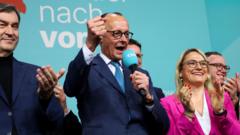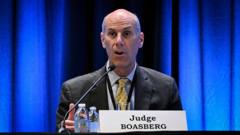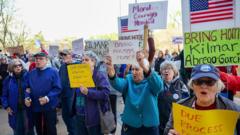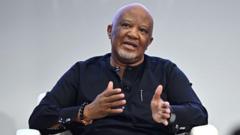The recent German elections indicate a significant shift in the political landscape, with conservatives celebrating their victory while facing challenges from growing far-right sentiments.
Germany's Election: Conservatives Win, Far Right Claims Historic Second-Place Finish

Germany's Election: Conservatives Win, Far Right Claims Historic Second-Place Finish
Friedrich Merz's victory marks a pivotal moment in German politics as the far-right Alternative for Germany achieves unprecedented support.
Friedrich Merz of the Christian Democratic Union (CDU) has emerged as the frontrunner in Germany's latest elections, though his party fell short of the anticipated 30% vote-share. Addressing a throng of supporters, Merz encouraged unity and collaboration with the Social Democrats, who claimed third place. His agenda includes striving for greater European independence from the United States, a topic that resonates amid growing concern regarding transatlantic relations.
A surprising development in the elections was the Alternative for Germany (AfD), which recorded a notable 20.8% of the votes, marking its highest support ever. AfD leader Alice Weidel celebrated, although the response was muted as the party had initially aimed for an even greater outcome. Merz, with no previous ministerial experience, vowed to lead Germany and prioritize European stability while bolstering aid to Ukraine.
The elections were marked by high voter turnout, reaching 83%, a first since the reunification of Germany in 1990. Amidst this turnout, the electorate exhibited a desire for change, which appeared beneficial to the AfD due to widespread frustration over rising costs and recent violent incidents in urban areas.
While Merz looks to forge a coalition, the prospects remain uncertain as the traditional dominance of CDU and the Social Democrats appears weakened. The AfD's rise in popularity especially in Eastern Germany indicates a significant shift in voter sentiment, with Weidel indicating that fresh elections may be on the horizon if Merz’s coalition falters.
Merz dismissed the AfD's successes, attributing it to unresolved societal issues and asserting that they will disappear if these challenges are addressed. Internationally, Merz’s victory has been met with approval, notably from leaders like France's Emmanuel Macron and the UK's Keir Starmer, emphasizing collaboration during uncertain times.
However, the political divide is evident as younger voters gravitate towards the AfD and other emerging parties, such as the Left, highlighting the changing dynamics within Germany's political arena. The CDU, while securing victory, faces critical challenges and a need to adapt to the evolving landscape that includes rising populism and a demand for immediate action on pressing social issues.
A surprising development in the elections was the Alternative for Germany (AfD), which recorded a notable 20.8% of the votes, marking its highest support ever. AfD leader Alice Weidel celebrated, although the response was muted as the party had initially aimed for an even greater outcome. Merz, with no previous ministerial experience, vowed to lead Germany and prioritize European stability while bolstering aid to Ukraine.
The elections were marked by high voter turnout, reaching 83%, a first since the reunification of Germany in 1990. Amidst this turnout, the electorate exhibited a desire for change, which appeared beneficial to the AfD due to widespread frustration over rising costs and recent violent incidents in urban areas.
While Merz looks to forge a coalition, the prospects remain uncertain as the traditional dominance of CDU and the Social Democrats appears weakened. The AfD's rise in popularity especially in Eastern Germany indicates a significant shift in voter sentiment, with Weidel indicating that fresh elections may be on the horizon if Merz’s coalition falters.
Merz dismissed the AfD's successes, attributing it to unresolved societal issues and asserting that they will disappear if these challenges are addressed. Internationally, Merz’s victory has been met with approval, notably from leaders like France's Emmanuel Macron and the UK's Keir Starmer, emphasizing collaboration during uncertain times.
However, the political divide is evident as younger voters gravitate towards the AfD and other emerging parties, such as the Left, highlighting the changing dynamics within Germany's political arena. The CDU, while securing victory, faces critical challenges and a need to adapt to the evolving landscape that includes rising populism and a demand for immediate action on pressing social issues.


















